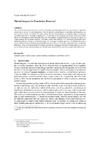Identificador persistente para citar o vincular este elemento:
https://accedacris.ulpgc.es/jspui/handle/10553/40083
| Título: | Mental imagery in translation processes | Autores/as: | De León, Celia Martín | Clasificación UNESCO: | 570113 Lingüística aplicada a la traducción e interpretación | Palabras clave: | Embodiment LASS theory Mental imagery Mental simulation OSIVQ, et al. |
Fecha de publicación: | 2017 | Publicación seriada: | Hermes (Denmark) | Resumen: | The use of mental imagery has been claimed in Translation and Interpreting Studies to help students to understand source texts as well as to avoid interferences. The role played by mental images in translation and interpreting has, however, been scarcely investigated. This study explores the use of mental images by translation students, drawing on embodied approaches to language comprehension - in particular, on the Language and Situated Simulation (LASS) theory. Five translation students translated three texts with different contents (respectively focusing on objects, on spatial relations and on abstract concepts). Four kinds of data were collected: (1) a self-report questionnaire about individual preferences in the use of mental imagery; (2) key-logged translation processes; (3) fnished translations, and (4) self-reports about mental imaging during the translation processes. The results suggest that there are individual differences in the use of mental images in translation and that the participants' individual imaging profles, as assessed by the self-report Object-Spatial Imagery and Verbal Questionnaire (OSIVQ), may help to explain these differences. | URI: | https://accedacris.ulpgc.es/handle/10553/40083 | ISSN: | 0904-1699 | Fuente: | Hermes (Denmark)[ISSN 0904-1699], p. 201-220 |
| Colección: | Artículos |
Citas SCOPUSTM
4
actualizado el 08-jun-2025
Visitas 10
285
actualizado el 09-ene-2026
Descargas
148
actualizado el 09-ene-2026
Google ScholarTM
Verifica
Comparte
Exporta metadatos
Los elementos en ULPGC accedaCRIS están protegidos por derechos de autor con todos los derechos reservados, a menos que se indique lo contrario.
